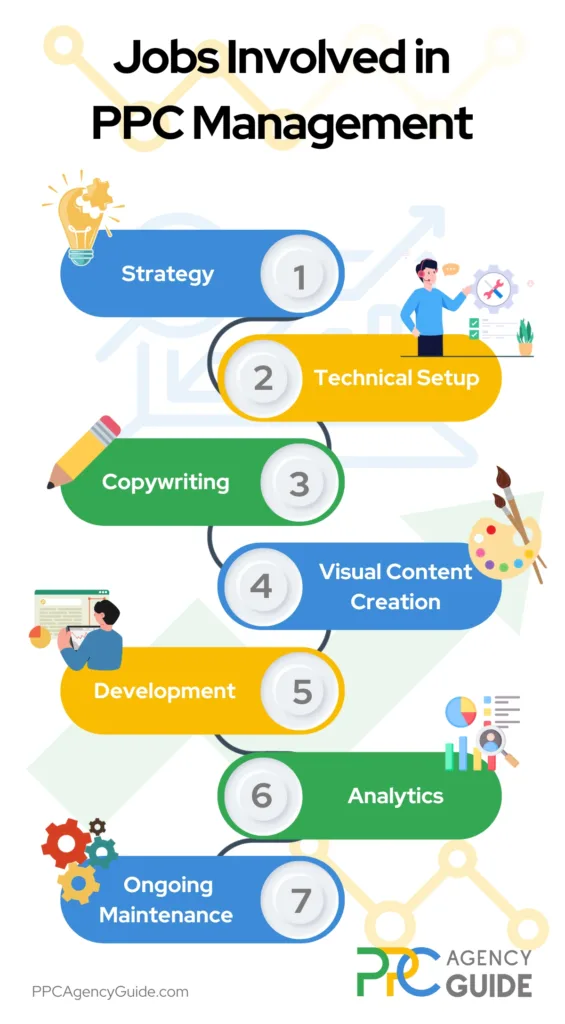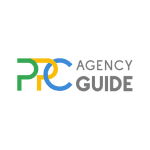
Are you overwhelmed trying to manage your pay-per-click (PPC) ads or struggling to learn everything you need to know to manage them effectively? It’s not you. PPC isn’t really a one-person job. Give us a few minutes, and we’ll walk you through why, what usually happens when businesses try to manage PPC in-house with a solo PPC specialist, and what your options are if you want to bring in help.
PPC Challenge 1: Ad Management Requires a Lot of Unrelated Skills
Perhaps the biggest misconception about PPC management is that it’s a single job. In reality, PPC management draws from at least six or seven distinct skill sets. While it’s possible for someone to have skills in more than one area, it’s virtually impossible for one person to be an expert in all areas.
Strategy
PPC strategy involves several high-level tasks that determine the overall success of your campaigns. A few strategy-related PPC duties include:
- Audience Analysis/ Persona Creation
- Ad Network Selection
- Keyword Research
- Budget Allocation
While these are all handled by one person in smaller teams, larger in-house digital marketing teams often split these tasks between professionals. For instance, a manager or leader will determine the audiences, networks, and budget allocation, while a PPC specialist or junior marketer will perform keyword research and pass their suggestions up the chain. A similar breakdown will occur when PPC management is outsourced.
Technical Setup
Very small in-house marketing teams will sometimes have the person responsible for strategy handle the technical setup. However, this approach tends to be an inefficient use of a manager or leader’s time. Technical setup includes tasks like:
- In-Platform Setup
- Bid Optimization
- Automation/ Workflow Creation
Automation includes duties such as setting up digital forms, ensuring the data imports into a customer relationship management (CRM) tool, assigning and noting a sales rep, and adding the lead to relevant marketing lists or workflows. Because it’s integral to success but isn’t specific to ads, some companies will have someone else on the marketing team, operations, or development set this portion up. PPC agencies will usually split the duties, too.
It’s also worth noting that each ad platform works differently. Because of this, you’ll often see ad specialists work with just one or two platforms rather than all of them. For instance, someone may work with Google Ads and Microsoft Advertising but not Facebook or LinkedIn. Another specialist may work with Amazon Ads but not the others.
Copywriting
There are many different types of writers in the marketing realm. For instance, some content writers specialize in creating descriptive and researched long-form copy, while others are adept at crafting product descriptions or SEO copy.
There are lots of nuances to PPC copywriting that make it distinct from these other areas. For example, the PPC ad writer must be able to create highly clickable text using just a few characters while being mindful of keywords and personas.
Because even adept writers aren’t always strong ad copywriters, this is a role that PPC agencies and full marketing teams hire for specifically. The person focuses solely on crafting ads.
Visual Content
Most ads include some type of visual content that a video producer or graphic designer must create. Like writing, this is often its own subset because creatives tend to specialize in a specific area.
Development
Landing pages increase conversions, so each ad group will require a unique landing page to carry the visitor to the next stage of their journey. This step is usually handled by a developer who understands how the site is coded and can make adjustments to ensure everything works correctly and flows together as it should.
Analytics and Optimization/ Ongoing Maintenance
Analytics and optimization are usually two distinct jobs because they draw from different skill sets. However, it’s easier to cover them as a pair because they work closely together.
The analytics professional handles all the initial setup to ensure ad results are correctly tracked, including website visits, time on page, and conversions. They’ll also set up specialty tracking, such as call tracking related to ads. This person is also involved in ongoing analytics and reporting, such as A/B testing and providing the team with recurring reports across all campaigns.
Conversely, optimization refers to all the ongoing tasks that help improve ad performance. These tasks are often handled by the same person that addresses the technical setup at the start of a campaign, by the strategist, or by a mix of the two. Duties include running A/B tests to see what performs best and evaluating Ad Quality scores to see what can be improved. This person may also set up remarketing and retargeting campaigns and prune non-performing keywords and ads to ensure more of the budget goes toward areas that deliver better ROI.
PPC Challenge 2: Paid Ads Work a Bit Differently for Every Industry and Business
We’ve discussed how running PPC ads for a B2B business differs from running ads for a B2C business. For instance, the customer journey is longer in B2B, and audience targeting requires adjustments. Even more changes occur at the industry and business level. For example, you may need to be concerned about regulatory compliance within some industries. Keyword selection and voice may be totally different.
Because of this, even someone skilled in most areas of PPC may not be fully equipped to take over PPC for another brand.
PPC Challenge 3: Managing PPC Can Be Time-Consuming
Many newcomers ask, “How long does PPC take?” Unfortunately, there’s no one-size-fits-all answer here, but we can provide some general guidance.
Setup Time

Generally speaking, it takes professionals a day or two to set up a new PPC campaign, though this depends heavily on the campaign size and how much strategy work needs to be done before setup can occur. This figure assumes that copywriting, visual content, analytics, and other aspects are already addressed by experts in those fields.
Time to Effectiveness
While you’ll likely see some results from your PPC campaigns immediately, it usually takes about three months before the advertising platform algorithms understand your audience and your ads are optimized enough to start seeing significant results.
Ongoing Maintenance
Around 40 percent of ad agencies spend two to four hours per week performing ongoing maintenance for each brand they serve, according to WordStream. Nearly one in five spend five or more hours per week.
Unfortunately, most brands managing their own campaigns don’t address this step at all, which means they’re not getting the best ROI possible. For example, more than half of all Google Ads users haven’t logged into their account in a month, HubSpot reports. Around a quarter haven’t checked their accounts in 90 days. This may be because they don’t have the time to begin with.
However, the structure of your campaigns plays a significant role in how much time you must invest in maintaining them. If you inherited someone else’s mess or have been learning as you go, you could easily be spending double or triple the amount of time managing accounts as you might if a professional had set them up.
PPC Challenge 4: You Need the Right Tools (And Time to Learn Them)
There are many PPC tools to choose from in addition to the native advertising tools each platform provides. For example, some help with keywords, while others assist with optimization or reporting. These tools can save a considerable amount of time, but you need to select the right ones for your needs and be able to allocate time to learn how to leverage them effectively. This rarely happens when a single person is managing PPC.
PPC Challenge 5: The Rules and Options Keep Changing
Google Ads makes dozens of announcements each year about major feature changes. The platform undoubtedly makes hundreds of minor tweaks that it doesn’t publicize. This is just one of many ad networks. It is impossible to stay on top of all developments as a solo practitioner.
Alternatives to Running PPC Ads Alone
Creating high-performing PPC campaigns requires a team effort. You have three primary options if you’re ready to get better results with less stress.
Build an In-House Team
If you already have most or all the specialists required to build an entire in-house team, such as developers and designers, rounding out your team with a PPC specialist may make the most sense. However, most brands do not need a full team, so this approach tends to be overkill unless you have a large company.
Hire a Freelancer
Freelancers can fill in the blanks on your team and don’t require full-time or even part-time hours. This approach can work well if you like the idea of building an in-house team but aren’t ready for one yet. However, the issue is that you’re still responsible for managing the team and ensuring everything is done correctly. If you don’t have the time or the knowledge to manage freelancers, this approach will not be a good fit.
Work with a PPC Agency
An experienced PPC agency can tackle it all for you and ensure that an expert in that field manages each task. This approach can work well if you want better results but don’t want the burden of managing a team. Ensure you’re working with a PPC agency that understands your industry and business to shorten the learning curve. To be matched with a PPC agency specializing in your industry now, request a complimentary consultation.



















